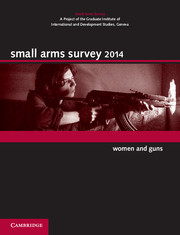Book contents
- Frontmatter
- Foreword
- Contents
- About the Small Arms Survey
- Notes to readers
- Acknowledgements
- Introduction
- Chapter 1 In War and Peace: Violence against Women and Girls
- Chapter 2 Converging Agendas: Women, Peace, Security, and Small Arms
- Special Feature. Women behind the Gun: Aiming for Equality and Recognition
- Chapter 3 Breaking New Ground?: The Arms Trade Treaty
- Chapter 4 Trade Update: Transfers, Retransfers, and the ATT
- Chapter 5 Countdown to Catastrophe: The Mpila Ammunition Depot Explosions
- Chapter 6 Across Conflict zones: Ammunition Profiling
- Chapter 7 Signs of Supply: Weapons Tracing in Sudan and South Sudan
- Chapter 8 On the Record: Illicit Weapons in the the United States
- Index
Chapter 7 - Signs of Supply: Weapons Tracing in Sudan and South Sudan
Published online by Cambridge University Press: 05 July 2014
- Frontmatter
- Foreword
- Contents
- About the Small Arms Survey
- Notes to readers
- Acknowledgements
- Introduction
- Chapter 1 In War and Peace: Violence against Women and Girls
- Chapter 2 Converging Agendas: Women, Peace, Security, and Small Arms
- Special Feature. Women behind the Gun: Aiming for Equality and Recognition
- Chapter 3 Breaking New Ground?: The Arms Trade Treaty
- Chapter 4 Trade Update: Transfers, Retransfers, and the ATT
- Chapter 5 Countdown to Catastrophe: The Mpila Ammunition Depot Explosions
- Chapter 6 Across Conflict zones: Ammunition Profiling
- Chapter 7 Signs of Supply: Weapons Tracing in Sudan and South Sudan
- Chapter 8 On the Record: Illicit Weapons in the the United States
- Index
Summary
INTRODUCTION
The second civil war (1983–2005) between the Government of Sudan (GoS) and the Sudan People's Liberation Movement/Army (SPLM/A) led to the secession of South Sudan, in July 2011, but not to an end to armed conflict within or between the two countries. From 2010 to late 2013, a number of anti-government militias were engaged in vigorous insurgencies in South Sudan, while separate branches of the SPLM-North (SPLM-N) were fighting a rebellion on two fronts in the Sudanese states of South Kordofan and Blue Nile. The SPLM-N also established an alliance with armed opposition groups in Darfur, which continue their campaigns despite peace agreements signed in 2006 and 2011.
None of these opposition forces could pose a threat without access to small arms and light weapons and ammunition. Yet, while the Small Arms Survey and others have documented the role of weapons in the multiple conflicts involving Sudan and South Sudan over the past ten years, details related to the specific types of materiel, their sources, and possible pathways into the hands of non-state armed actors have been slow to emerge.
To address this information gap, the Small Arms Survey's Human Security Baseline Assessment (HSBA) for Sudan and South Sudan launched the Arms and Ammunition Tracing Desk in 2011.
- Type
- Chapter
- Information
- Small Arms Survey 2014Women and Guns, pp. 212 - 243Publisher: Cambridge University PressPrint publication year: 2014

